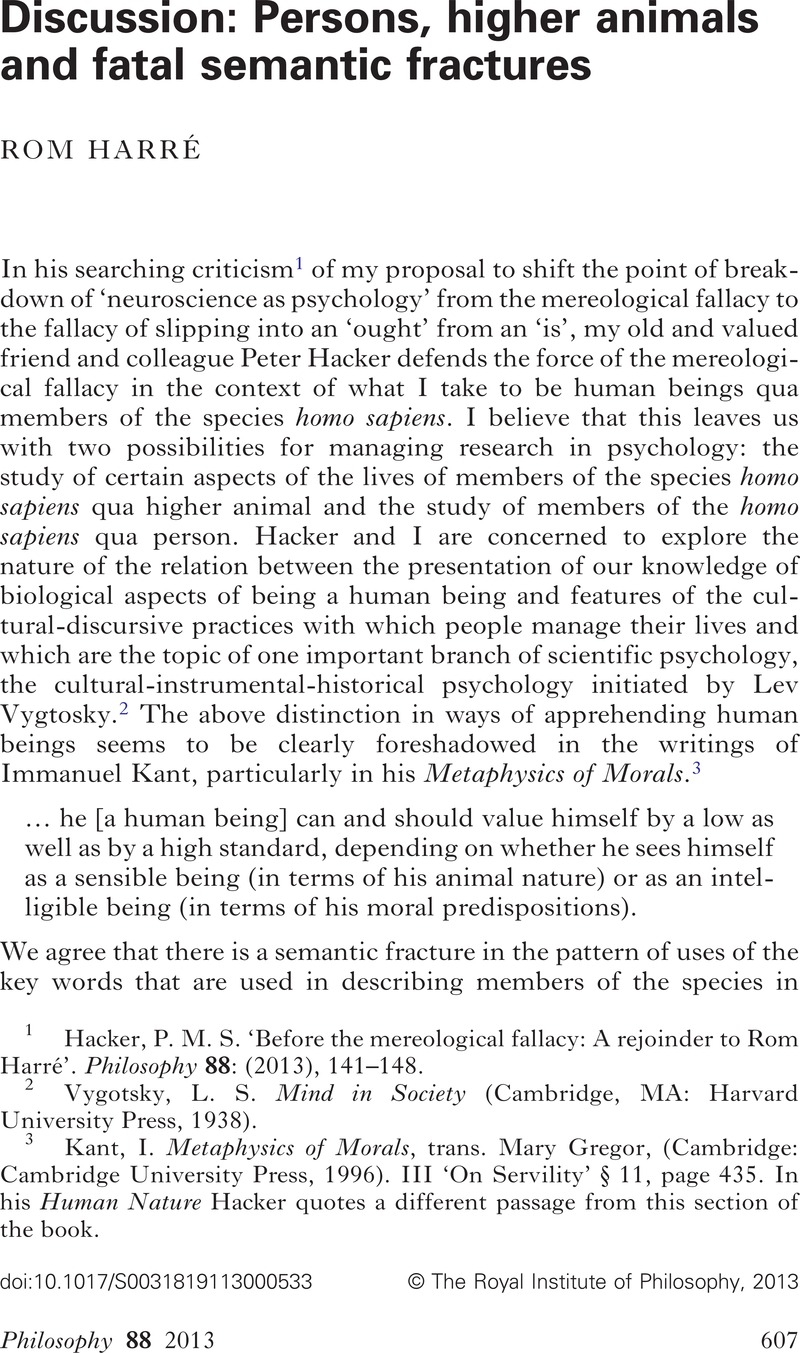Published online by Cambridge University Press: 28 August 2013

1 Hacker, P. M. S. ‘Before the mereological fallacy: A rejoinder to Rom Harré’. Philosophy 88: (2013), 141–148CrossRefGoogle Scholar.
2 Vygotsky, L. S.Mind in Society (Cambridge, MA: Harvard University Press, 1938)Google Scholar.
3 Kant, I.Metaphysics of Morals, trans. Gregor, Mary, (Cambridge: Cambridge University Press, 1996)CrossRefGoogle Scholar. III ‘On Servility’ § 11, page 435. In his Human Nature Hacker quotes a different passage from this section of the book.
4 Hume, D.A Treatise of Human Nature, Bk III, Part 1, Section 1 (London: Collins, 1739/1972)Google Scholar.
5 See, for instance, John Milton's Il Penseroso and L'Allegro.
6 Bennett, M. & Hacker, P. M. S.Philosophical Foundations of Neuroscience (Oxford: Blackwell, 2003)Google Scholar.
7 For a collection of gems see for example Bennett & Hacker, op. cit., 152–153.
8 Bennett & Hacker, op. cit., passim.
9 The title of my paper was ‘Behind the Mereological Fallacy’, not ‘Instead of the Mereological Fallacy’.
10 Morris, D.The Naked Ape: A Zoologist's Study of the Human Animal (London: Vintage, 2003)Google Scholar.
11 Bennet & Hacker, op. cit., passim.
12 Bennett and Hacker, op. cit., 72.
13 Vygtosky, L. S., op. cit.
14 Bruner, J. S.Actual Minds, Possible Worlds (Cambridge, MA: Harvard University Press, 1986)Google Scholar.
15 Shweder, R. A.Thinking Through Cultures (Cambridge, MA: Harvard University Press, 1991)Google Scholar.
16 Bennett & Hacker, op. cit.
17 Harré, op. cit.
18 Hacker, op. cit., 312.
19 Hacker, op. cit.
20 ‘People’ sometimes means a collection of persons in the cultural-discursive sense, sometimes it means a collection of human beings, as Hacker points out.
21 Brinkmann, S. ‘Towards an expansive hybrid psychology integrating theories of the mediated mind’. Integrative Psychological and Behavioral Science 45 (2010).Google Scholar
22 Grattan, K. ‘The dispute over the fate of Terrri Sciavo’, in Harré, R. and Moghaddam, F. M.The Self and Others (Westport, CT: Praeger, 2003), 113–145Google Scholar.
23 Dunbar, R.Evolution and the Human Sciences (London: Sage, 2007)Google Scholar.
24 Wittgenstein, L.Philosophical Investigations (Oxford: Blackwell, 1953), §281Google Scholar.
25 How far down the chain of ‘higher animals’ may we go without falling into anthropomorphism? Surely we must include dogs (though so far as we know Wittgenstein never kept one) and chimpanzees, such as Washoe.